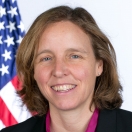
The face of manufacturing is rapidly changing and expanding across the country. Manufacturing has always represented so much of the best of what America has to offer – ingenuity, creativity, innovation, grit, persistence, teamwork – this time around we are seeing a shift in the look, goods, make-up and culture of so many of our manufacturing centers, in the heart of cities, in small towns, across rural America and Tribal Nations.
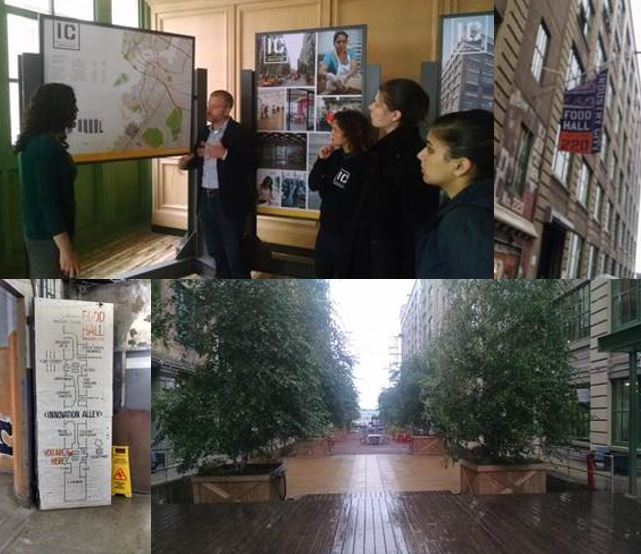
As part of celebrating Manufacturing Day across the United States last Friday – American manufacturers opened nearly 2,000 factory doors to showcase the story of 21st century advanced manufacturing and making. It’s the story of state-of-the-art scientific and engineering processes that command next-generation light weight composites to power the cars of tomorrow. It’s the story of the assembly lines spinning conductive fibers so that the next generation of textiles can monitor your vital signs when you’re going for a run or injured in the field. And it’s the story of manipulating light to power computer chips at speeds never before realized, while saving energy along the way. And in the end, it’s a story of people – hard working American entrepreneurs and their teams – building a path forward for this country, together.
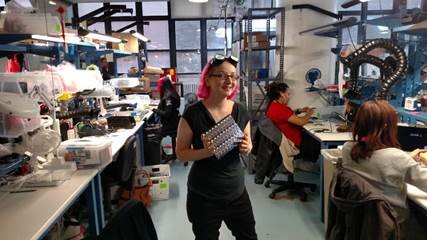
That forward-leaning face of modern manufacturing was on full display in New York City today as, Limor Fried—a founder of an open-source hardware community—led Chief Technology Officer Megan Smith Senior Policy Advisor for Advanced Manufacturing and AAAS/ORISE Fellow Megan Brewster and Senior Advisor for Science, Technology, Innovation, & Partnership Puneet Ahira on a tour of Adafruit Industries. Adafruit has hired 50 employees and invested in over 15,000 square feet of space in the heart of Manhattan to build a one-of-kind online environment for makers of all ages and skill levels to master electronics and use modern digital tools – including 3D printers, laser cutters, and desktop machine tools – to develop new products for the market place.
The rapid deployment of these digital tools, and their precipitous drop in price, is empowering entrepreneurs and companies to transform ideas into working prototypes faster than ever before. Similar to online tools like the Internet and cloud computing that have lowered the barriers to entry for digital startups—we are now bearing witness to new tools for democratized production.
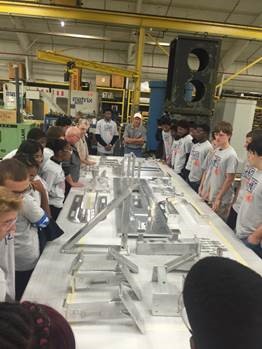
And, just a few hours away, in the heartland of the ingenuity, grit and determination of America’s workforce, Deputy Director of the National Economic Council Jason Miller kicked-off Manufacturing Day in Detroit with over a hundred middle school students eager to make things with their own hands at the Michigan Science Center. Not only was the celebration in Detroit a keen reminder of how responsible investments, and a bet on the regional talent, helped the automotive sector roar back, supporting families across Michigan—but it also underscored how investing in Detroit spurred a spillover boom in surrounding sectors including suppliers, distributors, and new IT and software jobs for the region.
The follow-on investments keep trickling in. Jason also joined several Macomb County public school students and technologists on a tour of Futuramic Tool & Engineering Company which recently invested $20 million to build a 300,000 square foot facility in Warren, Michigan. This effort expands its operation from the west coast to the Midwest by adding over 100 new jobs and supports the region’s rapidly-growing fabrication supply chain support of the aerospace industry. The investment of modern equipment sharpens the capacity of firms like Futuramic to design and build mission-critical components parts for rockets that are set to go to Mars; and has the power to excite and animate young minds in the community, America’s future manufacturing workforce.
It’s also why the White House Office of Science and Technology Policy’s Senior Advisor for Making, Stephanie Santoso, joined the Mayor of Louisville, Kentucky Greg Fischer today, at FirstBuild’s Manufacturing Hackathon. Makers across the US are all ages. In Louisville, more than 70 high school and college students, designers, engineers and makers participated in the hackathon, which was focused on developing an easy-to-manufacture device for roasting coffee beans at home. GE and Local Motors, which develops and manufactures customizable, open-source vehicles, teamed up to create FirstBuild in 2014. FirstBuild’s online platform enables individuals to submit and develop their own ideas for smart home appliances.
FirstBuild’s headquarters on the University of Louisville campus includes a 34,000 square foot makerspace and microfactory, which is open for students, families and adults in the Louisville community to use. While innovative designs from the online platform are tested out in the makerspace, the facility is also home to a variety of other projects focused on social impact, such as a low-cost hearing aid and shelter that could be quickly deployed in emergency situations. In addition, engineers at FirstBuild have been working with students at 5 colleges in design and engineering programs. Students from Purdue University, Rose-Hulman Institute of Technology, University of Louisville, Ohio State University, Columbus School of Art and Design and the University of Maryland are working on community focused projects such as designing user-friendly appliances for individuals with disabilities.
Innovative approaches to design and manufacturing like this allow teams of individuals to work together on prototypes, fabricate components, incubate start-ups and develop local workforce talent, ventures like these place America’s manufacturing entrepreneurs at the forefront of opportunity.
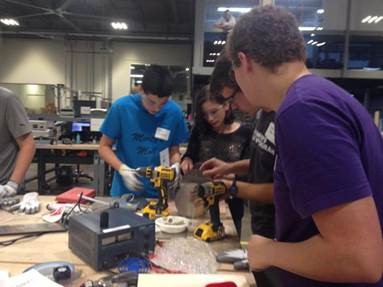
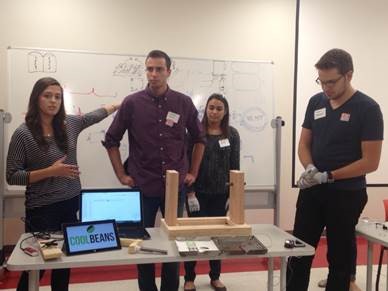
America’s entrepreneurial ecosystem is the envy of the world. Every day, from New York to Kentucky to Michigan and beyond – innovative Americans design, manufacture, and scale their businesses and share new products with the world. We can continue to support and expand that talent if we make smart, responsible investments right here at home and encourage American’s to join these entrepreneurial companies.
President Obama came into office committed to investing in U.S. manufacturers, to reverse the last decade’s off-shoring of American jobs and shutting down factories. Moreover, these investments are strategically building on the strengths of the world’s most productive workforce; enable durable infrastructure, connect entrepreneurs with markets; and position our industry at the leading edge of advanced technologies – so that we don’t just invent things it in America, but we make them here, too.
The world is taking notice. Investment by foreign companies in the United States is increasing faster than foreign investment in any other country in the world. America has been rated the most attractive place to invest by global companies for the first time since 2001. The President has made commitments to make sure we stay at the top of the world’s list.
Through renewed commitment to the Manufacturing Extension Partnership (MEP), we have seen public and private dollars revitalize small manufacturers in this country. The President has also stood up the National Network of Manufacturing Innovation (NNMI) Institutes—regional hubs to bring together industry, academic, and government partners to ensure American manufacturers maintain their comparative advantage in ingenuity and innovation in areas like 3D printing, power electronics, and digital manufacturing.
And just today, we announced a new Consortium for Advanced Manufacturing Foresights. The Consortium will connect industry and academic know-how, with the nearly $2 billion the Federal government invests annually in fundamental and applied research. Collectively, these steps ensure that the Administration does its part to foster the most promising technologies with the most informed investments.
We’ve come a long way, with solid investments in American ingenuity – and those returns were on full display across the factory floors we visited today. And yet, there is more to do --- we’re still not where we need to be and need to keep pushing. Now is the time for us to re-double our efforts and continuing making the essential investments to cultivate long term economic growth, and arm our next generation of manufacturing workers with adequate training and education.
On Manufacturing Day and every day, we will fight for America’s creative entrepreneurs and talented workers, the resources they need to create and innovate, and the skills they need to remain the most desirable workforce in the world. We ask all Americans, from every background, across this great nation, to join us in equipping their communities with the 21st-century design and fabrication skills to improve job and career opportunities across the country, and to bring to life a cornucopia of products for the betterment of people here at home and around the globe.
Jason Miller is Deputy Director of the National Economic Council.
Megan Smith is the U.S. Chief Technology Officer.
